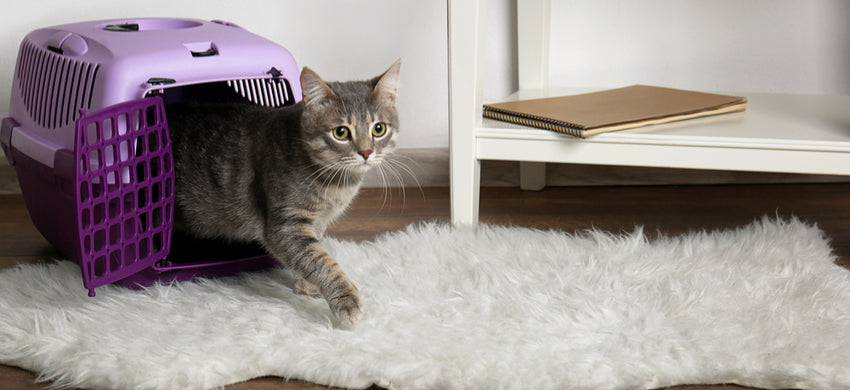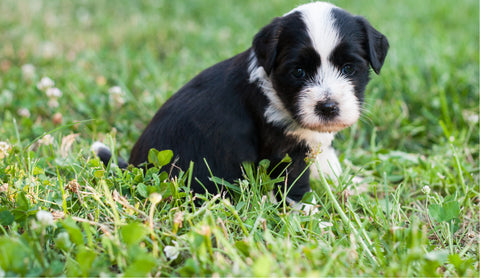
Is your pet stressed?
Do you have a jumpy cat that climbs the curtains or a dog that’s spooked by its own shadow? In Stress Awareness Month, we look at how to spot when your pet is stressed and the best ways to calm their jangling nerves.
… and breathe
As a pet owner, you know for yourself how wonderfully relaxing it can be to have a feline or canine companion at your side. Just by stroking your cat or dog, you can feel your stress dissolve. It’s scientifically proven, too, that having a pet in your life can improve your mental health by reducing your stress and anxiety.
But how about our pets? What can we do to make sure their lives are as stress-free as possible? And how can we calm down an anxious pet?
Try the P.E.E.P. test
If your pet is stressed, it won’t march off to the shed in a huff, crash pots and pans in the kitchen or go and play loud music in its bedroom. So we need to pay attention to different, subtler signs to discover what’s going on.
Together with our in-house veterinary professionals, we’ve come up with a special P.E.E.P. test that you can use to help spot signs of stress in your pet.
P = Posture – Is your pet hunched, tense, cowering or defensive?
E = Eyes – Are their eyes wide, strained or pupils dilated?
E = Ears – Does it look like their ears are flattened or pinned back?
P = Position – Is your pet turning away, hiding or fleeing / freezing?
If your dog or cat is showing any of these behaviours, they may well be suffering from stress.

Pets under pressure
There are many reasons why your pet might feel ill at ease. One of the main causes is a change of circumstances. Pets love routine – the same bed, the same blanket, the same people and animals around them.
When a new puppy or kitten arrives in your home, your older cat or dog might feel unsure of its territory and its place in your affections.
Loud noises – whether it’s fireworks or building works next door – can leave our furry friends feeling jumpy. And as for travelling? Well, whether you’re taking your pet on holiday or to the vet, some animals will find this distressing.
Keep cool in the car
With Easter holidays coming up, you may be planning a trip away, so here are some tips for helping your four-legged friends stay stress-free in the car.
- Take your pet’s favourite blanket or bed with you so they can curl up on it in the car, feel comfortable and have the familiar smells of home around them.
- Plan regular stops so they can stretch their legs and take comfort breaks.
- Drive smoothly to reduce the chance of travel sickness and keep the windows open slightly to allow cool air to flow through the car.
A new arrival

You’re delighted with your new kitten or puppy. But your older cat or dog may not feel the same way about this young upstart. They could be put out at the invasion of their space and worried that the kitten or puppy will take up precious resources, such as their food and your affection.
Start by introducing the animals on neutral territory. For dogs, this might mean outside, rather than in your home. With cats, you might want to allow them to sniff each other through a stair gate, rather than put them in the same room straight away.
For both cats and dogs, make sure that the older animals keep their original food and water bowls and that their sleeping arrangements don’t change. For cats, it’s a good idea to make sure they can keep their favourite high vantage point so they feel safe.
Loud noises and bumps in the night
Our furry friends can easily get spooked by odd noises, whether it’s fireworks, thunder or your child rattling by on a skateboard. They can even get freaked out by something as innocuous as a shadow at the window or a plastic bag that’s whipped up by the wind.
Tactics for dealing with your pet’s distress depend on the source.
- For thunder or fireworks, make sure that your pet has somewhere quiet and calm to retreat to where the noise will disturb them as little as possible.
- If your dog is upset by the noise created by, for example, a child’s skateboard, you can show them the object up close, spin the wheels and give them a treat to reassure them that they won’t come to any harm.
- Cats generally hate hair dryers and hoovers, and the loud, sudden whooshing noises they produce. You can allay your cat’s fear by turning the machine on in another room and letting the cat escape to a high place if that’s what makes them feel safe.
YuCALM for chilled-out companions
It’s distressing to see a pet that’s clearly suffering from anxiety. Luckily, though, there are proven ways to help to lower those hackles and get tails wagging again.
For example, you can identify what’s triggering your pet’s fear and avoid it where possible. You can also try a calming supplement such as YuCALM Dog or YuCALM Cat from Lintbells at least three weeks in advance of a long journey or as a natural long-term aid for pets prone to anxiety.
Both YuCALM Dog and YuCALM Cat support the natural calming pathways in your pet’s brain with a clever combination of lemon balm, L-Theanine and fish protein.

What’s more, they generally show a good effect after just a few days, with the full benefits evident within 3-6 weeks.
One last thing
If a problem persists, talk to your vet or a Clinical Animal Behaviourist to devise a practical plan to help your pet. And if you spot any unusual changes in their behaviour or anything out of character, take your dog or cat to the vet to rule out any underlying conditions.









